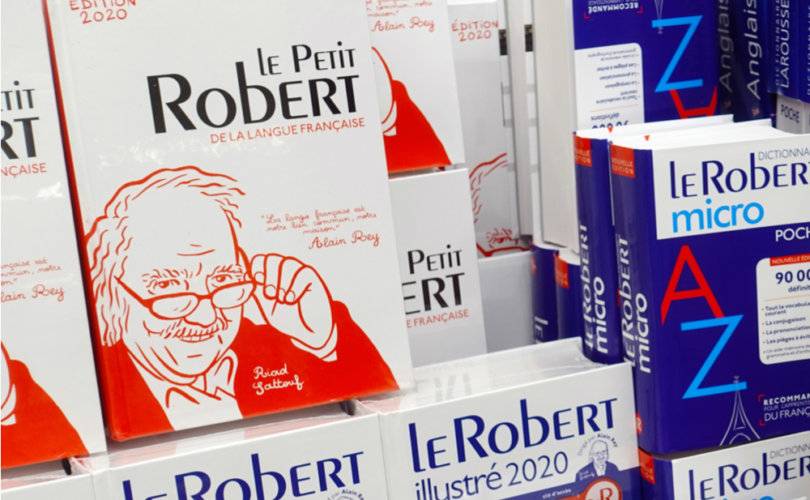PARIS (LifeSiteNews) — A major French dictionary has introduced a gender-neutral pronoun in its online edition, sparking much controversy among French academics and politicians.
The new pronoun “iel” (and its variants “ielle,” “iels,” and “ielles”) was added a few weeks ago to the online edition of Le Petit Robert, one of the most famous and prestigious French dictionaries, often used in French schools by students and teachers alike as the main reference for word spelling and definitions.
The pronoun “iel” and its variants are a mix of the traditional French third person masculine and feminine pronouns: “il” and “elle” in the singular, and “ils” and “elles” in the plural.
The decision is currently sparking much controversy in France.
On Tuesday, François Jolivet, a French MP and member of Emmanuel Macron’s party La République en marche took to Twitter to contest the move. In his tweet, Jolivet included a letter he sent to the French Academy to express his disapproval.
“Le Petit Robert, a dictionary considered as a reference, just included the words “iel, ielle, iels, and ielles” on its website. Its authors are therefore activists of a cause that is not French: wokism. I have written to the French Academy,” tweeted Jolivet.
In his letter to the French academy, Jolivet argued that the decision constitutes “an obvious ideological intrusion and an attack on our language and its influence.”
“As guardians of our language, could you tell me whether the French Academy has discussed this issue?” he asked the academy.
“If not, this orientation by Le Petit Robert would mark the introduction of ‘inclusive’ writing in our language, no doubt signalling the advent of woke ideology, synonymous with the destruction of our values,” he said.
The French Minister of National Education, Jean-Michel Blanquer, also voiced his opposition to the addition of the new pronoun.
“I, of course, support François Jolivet in his opposition to Le Petit Robert,” Blanquer wrote on Twitter. “Inclusive writing is not the future of the French language. Our students are consolidating their fundamental knowledge right now, they don’t need this as a reference.”
Gilbert Collard, a member of the European Parliament and member of the French right-wing party Rassemblement National also criticized the decision and accused Le Robert editions of wokism.
Even on the French left there were negative reactions.
“Woke ideology at work in Le Robert,” tweeted André Vallini, a former senator from the French socialist party.
In a statement published Wednesday on the dictionary’s website, Charles Bimbenet, editorial director of Le Robert editions, defended the insertion of the pronoun in the online version of the dictionary, and explained that researchers at Le Petit Robert had noticed a growing use of the pronoun “iel” in recent months. Bimbenet said that its introduction in the dictionary was discussed at an October editorial committee.
“Do I need to remind people that Le Robert, like every dictionary, includes words conveying ideas of the past, the present and the future, or of societal trends, etc.?” he asked rhetorically.

